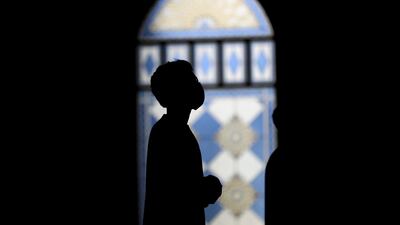Ever since I was a child, my elders counselled me to come to the mosque "prepared".
What they were referring to was not only be dressed in clean attire, but to arrive in a clear state of mind.
That means parking your worries and errant thoughts, for a few minutes anyway, at the steps of the mosque, before going inside to receive that much-needed dose of spiritual nourishment.
That message has taken on a deeper and more practical meaning this week, with UAE mosques reopening for the five daily prayers (with the exception of Friday prayers) from Wednesday, July 1.
While pleased at this development – I have never gone this long without visiting a mosque – the three months of mostly isolating at home has left me rather wary about congregating with groups of people, no matter the size.
This is why I chose to make my return for the fajr prayer at the crack of dawn, when the gathering, I hoped, would be significantly smaller.
A new and streamlined process
Not only was I mentally ready for this occasion, I came with my supplies.
As part of stringent safety measures put in place amid the pandemic, each visitor to the mosque must now wear a face mask and bring their own prayer mat. Also, with lavatories closed, the required pre-prayer ablution, known as wudu, must be completed at home.
These suggestions benefit both body and soul. By the time you get to the mosque, you feel both physically prepared and spiritually primed to partake in prayer.
I experienced an almost visceral reaction upon entering the prayer hall of Reem Island’s Al Azeez Mosque. It felt like reuniting with a dear friend who although was happy to see me, was strangely distant.
Like most sectors of society, the pandemic forced UAE mosques to streamline some of their processes to curtail unnecessary physical interaction.
This meant that not only do we come prepared to pray, but once the prescribed time strikes, we actually get straight to it.
This is a new development. Normally, when adhan (the call to prayer) is heard, the actual prayer begins 20 to 25 minutes later. This is done to allow worshippers some time for reflection, to read a few passages of the Quran or engage in optional prayers.
At Al Azeez, that no longer seems an option. Not only were the bookshelves, normally home to hundreds of copies of the Quran, stripped bare, but the prayer began only a few minutes after the adhan.
A minor miracle
And here came the biggest change: social distancing regulations caused the temporary suspension of prayer rows, with each of us standing three metres apart on a spot prescribed by bright signage.
It was, at first, hard to acclimatise. Islam has always prioritised the congregational prayer for its psychological benefits. Standing in line, shoulder to shoulder with people of all races and social standing, not only punctures the ego but provides a powerful tonic against bouts of loneliness.
Then, a small miracle occurred. Those oceans of space began to constrict once I bowed my head in prayer.
The yearning and melodious voice of the imam as he recited Quranic verses from Surah An Naziat, which compared our perceived challenges to God's majesty and capacity to change all situations, was deeply reassuring.

At the end of the prayer, the customary handshakes were replaced by mutterings of Assalam Alaikum (peace be upon you) by masked men with gleaming eyes.
“That was eerie and overwhelming,” Jehad, an Australian-Lebanese Reem Island resident, remarked outside. “I didn’t know what to expect, to be honest, but it made me realise how much I needed to come back. I missed this.”
Ahmed was more circumspect. Working in a department store in Abu Dhabi Mall, the Jordanian said returning to the mosque now provides him with space to process the challenges of the past three months.
“It has been an extraordinarily difficult time, brothers. I have met people that have really suffered from this situation,” he told Jehad as I stood by. “You always try to find the blessings in everything, even if it’s not clear. At least now we can come back to the mosque every day to remind ourselves that not everything is permanent. Things change. The mosques were closed and now they are back. We shouldn’t take life for granted.”
Outside, the night sky was beginning to turn a pastel pink. A new day was about to begin and for the first time in a long while, I felt like this is really a fresh start.














